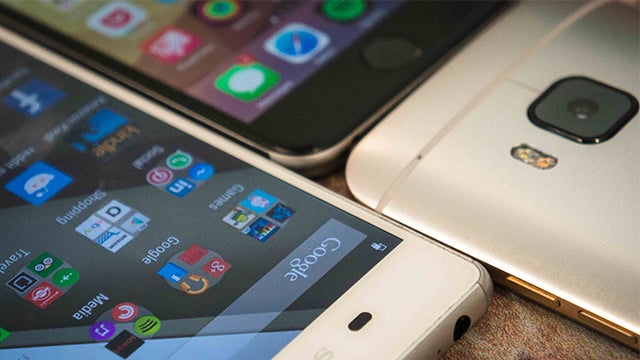Bought your child their first ever phone? Here’s what you should do next

To the joy of grownups and to the dismay of children across the nation, the summer holidays are almost over, and it’s nearly time to head back to school. Many kids, particularly those just about to start secondary school, will return to the classroom this September armed with their first ever mobile phone. For their parents, the next few weeks could be more stressful than usual.
After all, while smartphones are incredibly useful tools, you can also access some pretty nasty stuff through them. It’s easy to grow unhealthily attached to them too.
Related: Best cheap mobile phones
Trusted Reviews got in touch with cybersecurity firm McAfee, whose chief scientist and fellow, Raj Samani, has offered up some handy tips for parents who have recently got their child their first ever phone, and want to make sure they use it safely and sensibly.
“Many parents will have bought their child a first mobile phone if they’re now heading to secondary or high school. Largely, this will be to keep them safe and feeling confident, however there are understandably concerns around them having access to new communities and individuals outside of their parents’ view and control,” he said.
“Giving a child a personal phone is a big step that requires maturity and responsibility when in use, and unfortunately with all its positives, a phone also brings risk. It can expose children to a digital world where cyberbullies, hackers, and predators live, and open them up to peer drama, body image and material pressures.”
For some peace of mind at a potentially worrying time, here are some steps you should consider taking.
Set up the phone together
It’s 2019 and, let’s face it, your kids almost certainly already know how to use a smartphone. If not, they’ll get the hang of it pretty sharpish. However, no matter how wide-eyed with excitement they are about their new mobile, don’t simply hand it over to them.
“Put aside uninterrupted time to set up the new phone together,” says Samani. “Program your number and emergency numbers in first. Turn off location services, adjust privacy settings, turn on password protection. Lastly, discuss safe apps and apps that are strictly off limits.”
Read more: Best smartphone
Beware of malicious apps
Stories about infected apps exposing their users’ personal details are regularly in the news, and cybercriminals will continue to get a lot of joy from smartphone users who aren’t careful enough about the programs they install. Often, they’re seemingly completely innocuous apps like themes, wallpapers and flashlights.
“Apps are great, and kids can’t get enough of photo editing apps and games. However, every app comes with risks of malware that can quickly ruin the fun,” says Samani.
“Malicious apps can spy on a user’s location, personal data, and financial information. Teach your child to choose apps carefully. Read the apps’ reviews and make sure an app is trustworthy.”
Look at minimum age limits
Social networks and messaging services are some of the most popular smartphone apps, but you may or may not know that many of them have a minimum age requirement.
You need to be at least 13 years old before you can create an account with the likes of Google, Facebook, Instagram, Snapchat and Twitter, for instance. And for WhatsApp, the minimum age requirement for users recently went up from 13 to 16 last year.
As Samani explains, these restrictions are in place for two reasons:
- The Children’s Online Privacy Protection Act (COPPA), which prohibits companies from collecting data on kids under 13
- 13 is considered the age that kids understand what’s appropriate to share online
It’s worth reading up on them because, as we’ve seen over recent years, some major social networks have been linked with plenty of shady things, including depression, anxiety, and the spread of misinformation.
Read more: How to delete a Facebook account
Drill the basics in
Teach your child not to share their location, address, phone number, personal plans − we’ve all heard of those publicly advertised Facebook events that have ended in the near-total destruction of family homes − or even the name of their school online, Samani says.
“Also, make sure they know not to share their phone number or social media accounts with anyone they don’t know,” he adds. “If a phone number appears that does not have a known name attached, instruct your child never to answer it.”
Set up parental controls
As we all know, a phone can act as a portal to all sorts of content, and not all of it especially tasteful.
“No matter what anyone in the family is doing online, invest in a parental controls solution that can help keep connected children safe from inappropriate content, and unknown people looking to communicate with your loved ones,” is Samani’s advice.
“Products like this also have filtering software that blocks inappropriate websites and apps as well as establishes boundaries for family tech use, and time spent online.”
Here’s how to set up parental controls on Android and iOS handsets.
Read more: Best Android phones
Establish limits and expectations
Is it rude to get your phone out at the dinner table? Is there a particular point in the evening when you think mobiles should be put away? Different people have different preferences, so encourage what you believe to be good habits. Be warned though, it might not be easy.
“This will be the area where things get messy over time – the more kids integrate phone use into their lives, the more dependent they can become, and the more defensive they get about rules,” says Samani.
“So, stick to your guns. Set time limits on day one along with consequences. For instance, perhaps allow phone use after chores, homework, or family time and only for an hour, or have a no-phone zone such as the dinner table.”
Perhaps even consider downloading a smartphone-use-monitoring app like QualityTime onto your child’s phone, to help them keep track of their mobile usage.


